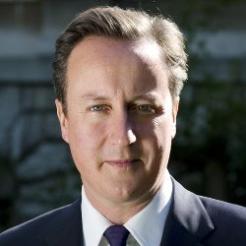The Prime Minister has advised ahead of next month's Budget that additional funding from the Department for International Development could be reassigned to defence.
David Cameron told journalists this morning that DFID is "no longer seen as, nor does it see itself as, a sort of giant NGO" and that "I think we have to demonstrate that the DFID budget is used wisely. One of the things that Justine Greening is rightly keen on is to make sure that countries that are affected by conflict, that we think about them particularly."
DFID is part of the National Security Council, he affirmed, and works "incredibly closely with the Foreign Office and the Ministry of Defence".
As the military is implementing significant funding cuts, one journalist at a briefing this morning noted that backbenchers have raised concerns over aid spending in this context. The journalist asked: "I’m just wondering whether you have any thoughts on whether or not there is more you can do, given that there is a sense among part of your party, maybe, that DFID’s doing quite well and the MOD’s not doing so well?"
In response Cameron said: "If you’re asking, can they work even more closely together, can we make sure that the funds we have at our disposal are used to provide basic levels of stability and security in deeply broken and fragile states, then yes, we should. I think that’s an important part of development."
Pooling funds
Questioned on whether this meant that there would be a "pooling of budgets" the PM said: "There is already. There’s the Conflict Pool, which we already have. Can we do more? Can we build on this approach? I’m very open to ideas like that. We have our moral responsibilities for tackling poverty around the world; we also have our national security responsibilities for mending conflict states and helping with development around the world. We should see DFID in that context."
The Conflict Pool is governed and managed jointly by DFID, the FCO and MoD and funds the government’s aims for preventing and managing international conflict. The official description of the pool states that it "helps address global conflict, by bringing together the UK government’s development, diplomatic, and defence interests". DFID would not confirm whether this meant funding troops or any other military resource.
According to DFID's accounts in 2011/12 £21.6m was spent via the joint Conflict Pool.
A DFID spokesperson said: "All DFID's aid spend is in line with internationally agreed guidelines.
"As part of the Strategic Defence and Security Review, we pledged to invest 30 per cent of our bilateral aid in fragile and conflict-affected countries by 2014/15 and we work closely with the FCO and the MoD to make sure our approach is joined up, including through the Conflict Pool which provides funding for conflict prevention."
Charities respond
Charities have raised concerns that the move would detract from the government's pledge to provide 0.7 per cent of gross national income to international aid. Charities involved in the recently-launched Enough Food for Everyone IF campaign, such as World Vision, directed the public to a petition to protect the aid budget via Twitter.
Oxfam's head of policy Max Lawson said people expect money to be spent on "schools not soldiers". "Aid is a very small proportion of government spending," he said, adding:
"We should not see a single penny diverted into the military. If the government needs to raise more money it should clamp down on tax avoiders rather than make insane choices between the safety of a family and their health and education."
Matthew Reed, chief executive at the Children's Society added his voice to concerns, saying: "The aim of aid should be supporting the poor, not UK foreign policy. Confusing the two also puts aid workers at risk."
National director for the Leprosy Mission England and Wales, Peter Walker, voiced concern that the move could mean the government plans to renege on its 0.7 per cent pledge: “We were delighted when David Cameron promised to protect Britain’s pledge to spend 0.7 per cent of national income on overseas development. We are concerned, however, that he appears to be going back on that promise today in a bid to compensate for defence cuts.
“Money needs to be found for both development and for peacekeeping in war-torn countries. The government has already stopped aid to India from 2015 – a country which is home to a third of the world’s poor. Although families in Britain are being squeezed, there is a desperate struggle for survival in the areas in which the Leprosy Mission works.
“We really do see the poorest of the poor and we have a moral obligation, as a country, to help these people. David Cameron’s proposition of subsidising the UK defence budget at the expense of the world’s poorest people must be challenged," he said.

| Want access to all civilsociety.co.uk content?Subscribers gain access to all expert advice, analysis, surveys, special reports and the full archive of content from as little as £43.20 per year. Find out more... |









